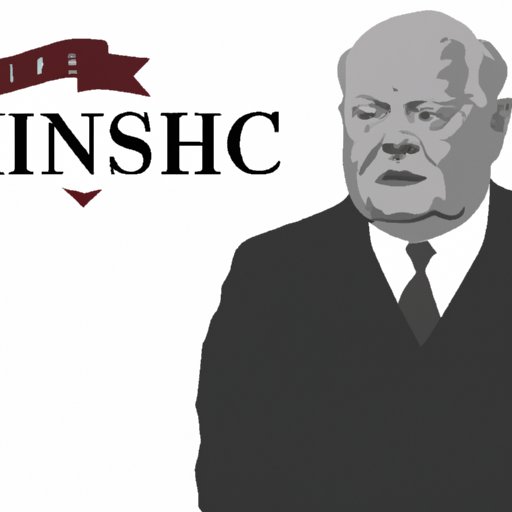Introduction: Who was Winston Churchill?
Winston Churchill (1874–1965) is widely regarded as one of the greatest leaders of the 20th century. He served as Prime Minister of the United Kingdom during World War II, leading the nation through some of its darkest hours. In addition to his political career, Churchill also had a long and distinguished military career, serving in both the Boer War and World War I.
Churchill is remembered for his courage, determination, and unwavering commitment to the cause of freedom. He was known for his eloquent oratory and his unswerving dedication to the defense of Britain. His leadership style has been studied and analyzed by scholars for decades, and it is still used as a model for modern leaders.
Analyzing Churchill’s Leadership Style
Churchill’s leadership style was characterized by his willingness to take risks and make bold decisions. He was a strong believer in the power of individual initiative and believed that the best way to achieve success was to “take the bull by the horns”. He was not afraid to make unpopular decisions and often went against the consensus of public opinion.
Churchill was also an inspiring leader who was able to motivate and rally people behind his cause. He was a masterful orator, and his speeches during World War II are still remembered today for their power and resonance. He was able to use his words to galvanize the British people in the face of adversity and inspire them to fight for freedom.
Churchill was also adept at managing crises. He had a keen understanding of the power of propaganda and was able to manipulate public opinion in order to achieve his political goals. He was also an expert strategist, and his decisions during World War II proved to be invaluable in securing victory for the Allies.
Examining the Impact of Churchill’s Policies
Churchill’s influence on British politics extended far beyond World War II. He was a key figure in the establishment of the welfare state, which provided financial assistance to those in need. He also championed free trade and supported the development of nuclear energy. In addition, he was instrumental in the creation of the United Nations.
Churchill was also influential in foreign policy. He believed in strong relations with the United States, France, and other European countries. He advocated for the creation of the North Atlantic Treaty Organization (NATO), which strengthened ties between these countries and helped to maintain peace in the region.
Finally, Churchill had a significant impact on economic policy. He implemented a number of measures to stimulate the economy, such as reducing taxes and increasing government spending. These policies helped to lay the foundations for a period of post-war prosperity.
Exploring Churchill’s Role in World War II
As Prime Minister during World War II, Churchill played a crucial role in defending Britain against Nazi Germany. He was a staunch advocate of the Allied cause and refused to negotiate a peace treaty with Hitler. Instead, he pursued a strategy of total war, mobilizing the country’s resources to defeat the enemy.
In addition to his strategic decisions, Churchill also made a number of speeches during the conflict. His most famous speech, “We Shall Fight on the Beaches”, was delivered to the House of Commons in 1940 and is remembered for its powerful words of defiance. Other notable speeches include “Their Finest Hour” and “The Few”, both of which were delivered in the same year.
Investigating Churchill’s Legacy
The legacy of Winston Churchill is still felt today. He is celebrated as one of the greatest figures in British history, and his name is synonymous with courage and leadership. His portrait hangs in many public buildings, and his statue stands outside the Houses of Parliament.
Churchill’s place in world history is also secure. He is remembered for his role in defeating Nazi Germany, and his image is often used as a symbol of freedom and democracy. He has also been memorialized in popular culture, with films, books, and television series devoted to his life and accomplishments.
Evaluating Churchill’s Strengths and Weaknesses as a Leader
Winston Churchill was undoubtedly a great leader who had a profound impact on British and world history. He was a courageous risk-taker who was willing to stand up to tyranny and oppression. He was an inspirational speaker who could motivate and rally people behind his cause. He was also a skilled strategist and a shrewd politician who understood the power of propaganda.
However, Churchill was not without his flaws. He was sometimes overly confident in his own abilities and could be stubborn and inflexible. He also had a tendency to alienate those who disagreed with him, and his decisions were not always popular. Despite these shortcomings, however, his legacy as a great leader remains undisputed.
Conclusion: Was Winston Churchill a Good Leader?
Winston Churchill was undoubtedly a great leader whose legacy continues to inspire people around the world. He was a risk-taker who was willing to make bold decisions and an inspirational speaker who could motivate people to action. He was also a skilled strategist who had a keen understanding of the power of propaganda. While he had his flaws, his achievements outweigh any shortcomings, and he remains one of the greatest leaders of the twentieth century.
(Note: Is this article not meeting your expectations? Do you have knowledge or insights to share? Unlock new opportunities and expand your reach by joining our authors team. Click Registration to join us and share your expertise with our readers.)
